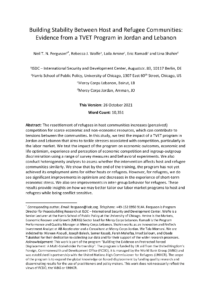In fragile and conflict-affected places, it can be difficult to successfully build or improve livelihoods through jobs-based programming. Yet, in many fragile places, some programmes are not only tasked with delivering on these outcomes but also with changing and improving the attitudes, perceptions, beliefs or behaviours of their participants, particularly towards the societies in which they live. Whether such programmes can deliver on these outcomes remains a frequent point of discussion. In this work, we consider the impact of a vocational training programme implemented by Mercy Corps in Jordan and Lebanon on social outcomes. In particular, given that perceived competition for access to economic resources has been argued to drive tensions between host and refugee communities in these places, it is theorised that a programme addressing these tensions should have positive spillovers in the social, as well as economic, outcomes of its participants. We find positive social impacts but only among members of the host community. If anything, perceptions indicators for host communities worsen. As our data show no biases in intergroup behaviour at baseline, we do not attribute this outcome to improving intergroup relationships but to more specific factors, such as the indirect reciprocation of kindness. These results show the potential weakness in treating conflicting sensitivity as simply a requirement to provide the same inputs to both host and refugee communities, regardless of the specific needs of each.
Publication Details
- Year of Publication: 2022
- Region/s: Middle East & North Africa
- Theme/s: Human Development · Impact Evaluation · Individual Decision-making · Shocks & Livelihoods · Violence & Peacebuilding
- Research Topic/s: Employment · Migration & Displacement · Peacebuilding & Reconstruction · Trust and Prosocial Behaviour · Violence & Conflict · Youth & Children
- Method/s: Experimental Designs · Panel Data Analysis · Quasi-Experimental Designs





